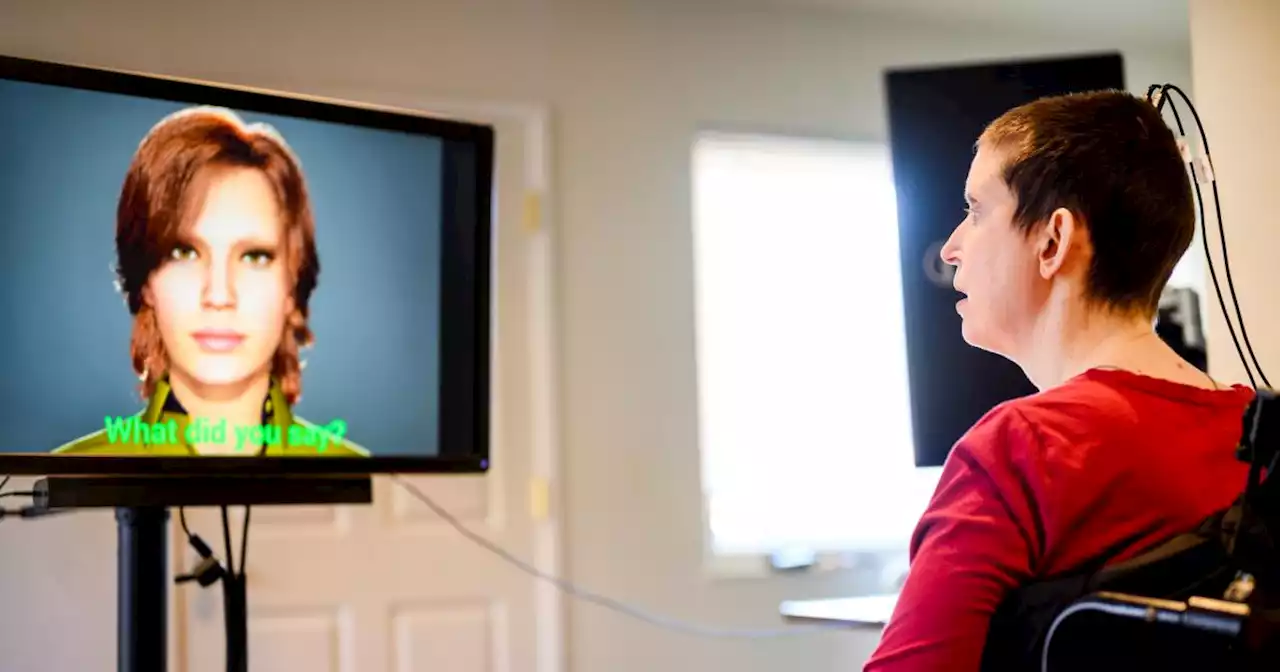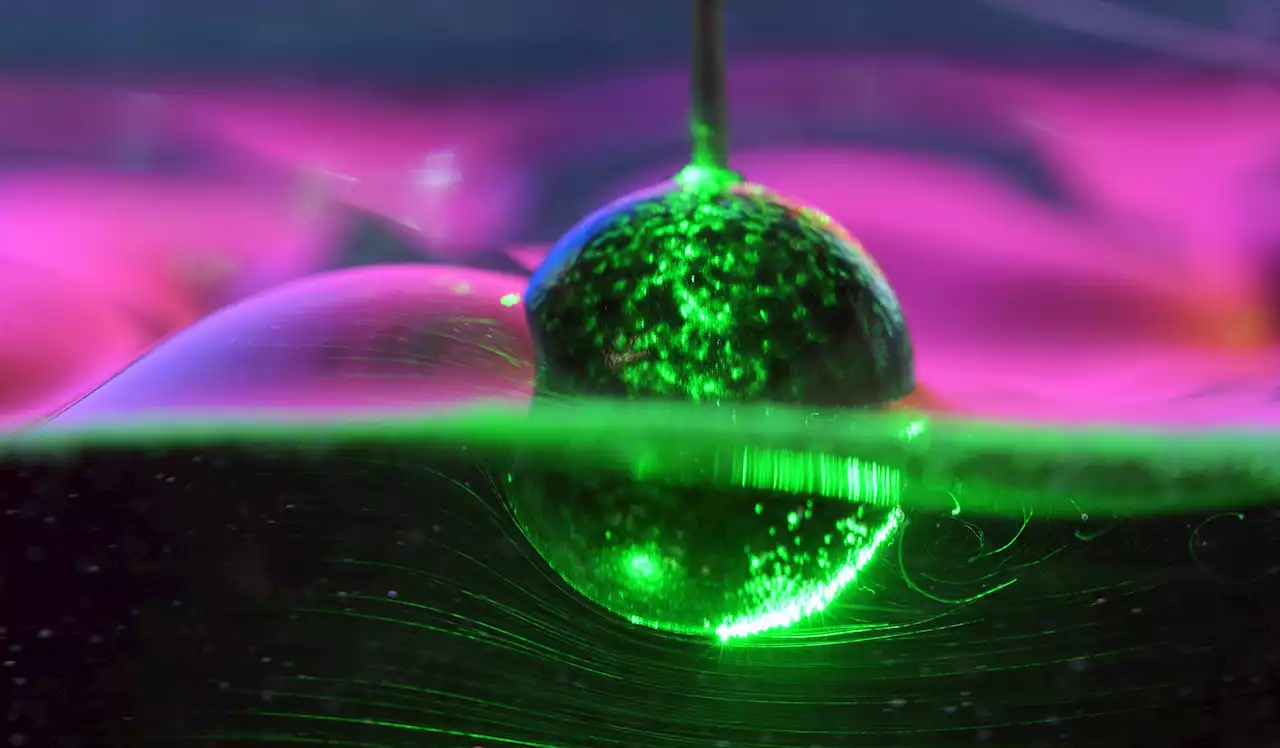Researchers have developed a brain-computer interface (BCI) that has enabled a woman with severe paralysis from a brainstem stroke to speak through a digital avatar.
Researchers at UC San Francisco and UC Berkeley have developed a brain-computer interface that has enabled a woman with severe paralysis from a brainstem stroke to speak through a digital avatar.
"Our goal is to restore a full, embodied way of communicating, which is really the most natural way for us to talk with others," said Chang, who is a member of the UCSF Weill Institute for Neuroscience and the Jeanne Robertson Distinguished Professor in Psychiatry."These advancements bring us much closer to making this a real solution for patients."
For weeks, the participant worked with the team to train the system's artificial intelligence algorithms to recognize her unique brain signals for speech. This involved repeating different phrases from a 1,024-word conversational vocabulary over and over again, until the computer recognized the brain activity patterns associated with the sounds.Rather than train the AI to recognize whole words, the researchers created a system that decodes words from phonemes.
To create the voice, the team devised an algorithm for synthesizing speech, which they personalized to sound like her voice before the injury, using a recording of her speaking at her wedding.
United States Latest News, United States Headlines
Similar News:You can also read news stories similar to this one that we have collected from other news sources.
 University of California BCI study enables paralyzed woman to 'speak' through a digital avatarA stroke-paralyzed patient has regained the ability to speak thanks to a BCI implant, albeit she now talks through a digital avatar..
University of California BCI study enables paralyzed woman to 'speak' through a digital avatarA stroke-paralyzed patient has regained the ability to speak thanks to a BCI implant, albeit she now talks through a digital avatar..
Read more »
 'Rare' fish endangered in two US states has researchers working to save species from extinctionResearchers at Pennsylvania State University are working with local wildlife agencies to boost Chesapeake logperch populations to prevent the fish from becoming federally endangered.
'Rare' fish endangered in two US states has researchers working to save species from extinctionResearchers at Pennsylvania State University are working with local wildlife agencies to boost Chesapeake logperch populations to prevent the fish from becoming federally endangered.
Read more »
 Researchers use 'topological gardening' to achieve unexpected spin transport'Trimming' the edge-states of a topological insulator yields a new class of material featuring unconventional 'two-way' edge transport, as reported in a new theoretical study from Monash University, Australia, published in Materials Today Physics.
Researchers use 'topological gardening' to achieve unexpected spin transport'Trimming' the edge-states of a topological insulator yields a new class of material featuring unconventional 'two-way' edge transport, as reported in a new theoretical study from Monash University, Australia, published in Materials Today Physics.
Read more »
 Researchers reveal van Hove singularity at Fermi level in kagome superconductorA team led by Prof. He Junfeng from University of Science and Technology of China (USTC) of the Chinese Academy of Sciences (CAS), in collaboration with Academician Gao Hongjun's team from CAS and other domestic and international research teams, has discovered the van Hove singularity (VHS) at Fermi level in kagome superconductors and revealed its relationship with superconductivity. Their work was published in Nature Communications on June 28.
Researchers reveal van Hove singularity at Fermi level in kagome superconductorA team led by Prof. He Junfeng from University of Science and Technology of China (USTC) of the Chinese Academy of Sciences (CAS), in collaboration with Academician Gao Hongjun's team from CAS and other domestic and international research teams, has discovered the van Hove singularity (VHS) at Fermi level in kagome superconductors and revealed its relationship with superconductivity. Their work was published in Nature Communications on June 28.
Read more »
 Building a stronger industry image will boost hospitality employment, say researchersFlinders University's Dr. Ashokkumar Manoharan collaborated with Associate Professor Christina Scott-Young (RMIT University, Melbourne), and Professor Anthony McDonnell (Cork University Business School, Ireland) to create a framework that creates an effective industry brand.
Building a stronger industry image will boost hospitality employment, say researchersFlinders University's Dr. Ashokkumar Manoharan collaborated with Associate Professor Christina Scott-Young (RMIT University, Melbourne), and Professor Anthony McDonnell (Cork University Business School, Ireland) to create a framework that creates an effective industry brand.
Read more »
 Fluid dynamics researchers shed light on how partially submerged objects experience dragOne of the most common and practically useful experiments in all of fluid dynamics involves holding an object in air or submerging it fully underwater, exposing it to a steady flow to measure its resistance in the form of drag. Studies on drag resistance have led to technological advances in airplane and vehicle design and even advanced our understanding of environmental processes.
Fluid dynamics researchers shed light on how partially submerged objects experience dragOne of the most common and practically useful experiments in all of fluid dynamics involves holding an object in air or submerging it fully underwater, exposing it to a steady flow to measure its resistance in the form of drag. Studies on drag resistance have led to technological advances in airplane and vehicle design and even advanced our understanding of environmental processes.
Read more »
